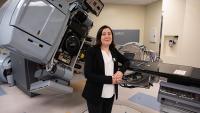7 min read
Students in rural Georgia are discovering new possibilities through Georgia Tech’s new Advanced Manufacturing Pathways program, where they design, build, and race custom cars while learning real manufacturing skills. With local educators and industry partners behind it, AMP is reshaping how communities imagine their future workforce.
3 min read
7 min read
Nuclear waste can be managed safely with proper safety protocols. Researchers at Georgia Tech and around the world are working on safer reactor designs, advanced monitoring, and innovative recycling methods to turn nuclear waste into new opportunities — from clean energy to long-lasting batteries and even space power.
3 min read
2 min read
8 min read
Raven Davis, Georgia Tech Library’s first data analytics research scientist, blends data analysis, instruction, and collaboration to boost student success. From literature lover to data scientist, she now leads coding workshops, evaluates programs, and champions equity, envisioning libraries as tech-driven hubs for innovation and community.
7 min read
2 min read
4 min read
5 min read















